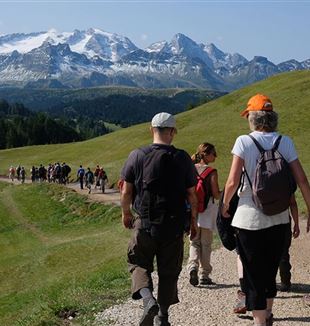
Corvara: That Which Stands the Test of Time
Over 200 people gathered for the International Assembly of Leaders of CL. We heard stories from Venezuela and Uganda, and the voice of Giussani from a lesson in 1968. All of this helped us rediscover how faith can change the life of everyone.“Because it is necessary for one period to end and for another one to begin: the definitive, the mature. These words are at the origin of our mature Christianity, one that can stand the test of time, the test of all history, because that announcement…” The voice of Luigi Giussani at at age 46 arrives, along with the scratchy sound of that November 1968 recording. Fifty years have passed, and in the hall of the Hotel Greif in Corvara, we hear the introduction to the Spiritual Exercises preached to that remnant of Israel which was the Peguy Cultural Center, the friends who remained after the storm of protest that had fallen on Gioventù Studentesca. 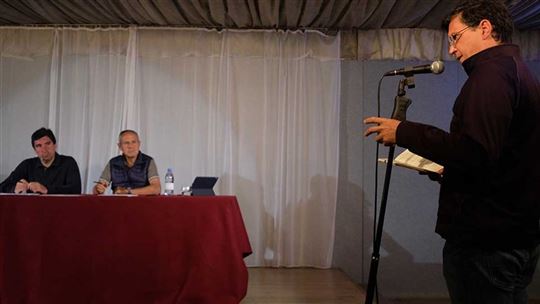
It is around this center of gravity that 270 people from fifty different countries have gathered in the Dolomites these days (25-29 August) for the International Assembly of Leaders of Communion and Liberation. The test of time, the difficulty of the circumstances, pain, death—How can faith remain alive? Father Julián Carrón opens the assembly with this question, while outside, under the majesty of Sassongher, a strange August snow was falling. He cited Etty Hillesum: “Souls are incredibly agitated. People get lost in the details. They lose the road and find life absurd.” In this situation, what contribution can the movement make to the Church and to society?
Father Leonardo, from Caracas, describes the humanitarian crisis in his country, Venezuela, where every day inflation goes up by five percent. They lack water, food and medicine. “For years I told Carrón I was available to go on mission,” the priest says: “Then, five years ago, he finally responded that he had a destination for me, Caracas. While thousands had fled from the country, I saw clearly that God was calling me to stay, to give witness to His victory.”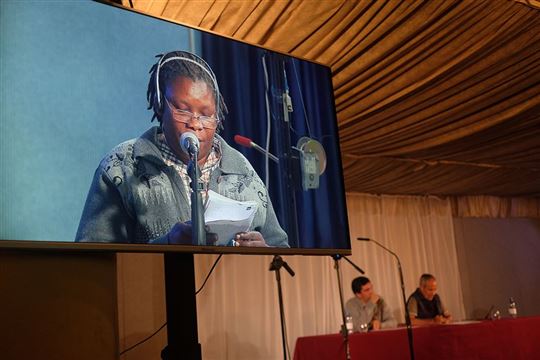
Teddy from Kampala, Uganda, explains how she became a widow and was evicted with her kids. Her in-laws, she recounts, were certain that she wouldn’t survive. “What sustained me was being in relationship with Christ. I, like Job, hadn’t done anything wrong. But like him, I had a great question about who I was. In my pain, I found myself closer to Christ. The contribution that I can give is this: asking myself who I am and who gives me all of this.”
Father Pigi and Max told us about their pilgrimage to Rome with the newly graduated, on the occasion of Pope Francis’ vigil with the youth, in view of the upcoming Synod on Youth. The whole “joyful war machine” of the secretariat was ready for the annual pilgrimage to Czestochowa. Eight hundred kids were all moving within the jungle of the Eternal City. It was a jumble of schemes and programs fell through. And yet, what prevailed was not a complaint, but the recognition of the event that happens within the difficulties. Like when, in the middle of a discussion among city police and traffic cops over who should deal with the group, an agent came out with: “I saw how you guys go about; you are different. I can take care of you.” “It is not about getting prideful about anything, but recognizing what is at the origin of this difference,” observes Carrón: “What has changed is a use of reason that is not reduced. When, rather than projecting onto things our scheme of how they should happen, we accept the provocation of reality and recognize its origin.”
There are both the “veterans” and the newly arrived in the hall. Teddy from Kampala (not the one already cited, but another, younger one) is visiting Europe for the first time. Hermann, from Kupang in Indonesia, had never been in Italy. For Giovanna, who met the movement eight years ago in Sao Paolo, Brazil, it is all new. She is so full of what she sees and feels that she can’t even sleep, and at three in the morning writes to the person who had invited her: “It is like I have a treasure in my hands. But it doesn’t belong to me; it is for the world. Why are we able to see the pain of the world, a world that, without knowing it, is begging to know Christ? I want to know Him more, to love Him more.”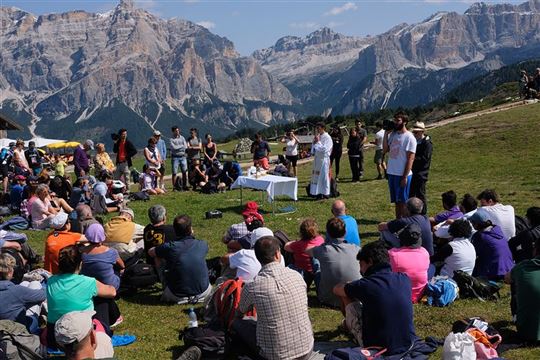
This theme of pain and of our wounds kept returning. Oscar Wilde wrote: “How else but through a broken heart may Lord Christ enter in?” Leonard Cohen also sang: “There is a crack in everything. That's how the light gets in.” And “the signs of the times” tell us that today’s man, more and more deeply, is marked by fragility, by fear, and by anguish which have been generated, as the Anglo-Indian journalist Pankaj Mishra defines it, by “the age of anger.” This is the theme of a dialogue between Roberto Fontolan, director of the International Center of CL in Rome, and Father Javier Prades, rector of the Theology Faculty of San Damaso in Madrid. What do these astounding data about the increase in depression, suicide, and mental illness, about which we read on the international level, tell us? Social relationships are more and more complicated. Communication is becoming more fragmented. “What can our contribution be?” asks Fontolan. “We have to go back to school,” explains Prades, “to help each other. We have to learn how to read reality. The Church has taught many different cultures how to read and how to work. She has created a new language. Today, we must learn again the grammar of creation, where the words and syllables of the discourse are the things that happen. But this must not be done with arrogance, but rather with an attitude that does not calculate.”
It requires a work of education, in the full sense, that “introduction to the whole of reality” which is necessary first of all for ourselves. And this education also has cultural consequences. It allows us to read the phenomena that happen. This is what Father José Medina and some of his friends are attempting to do with respect to the phenomenon which is taking over what we have always known as the “Land of Liberty”. There is a growing request on the part of young people to circumscribe the freedom of expression with rules that are ever more rigid. This is what Greg Lukianoff observes: a system where young American today are vulnerable, unprepared to be in front of reality, incapable of looking at suffering and hard work. We see the ever-growing amount of cases, above all in the universities, of the creation of safe spaces: offices expressly designed where you can be listened to without being judged or attacked. Thus, an “echo chamber” is created, a protected space in which we can enclose ourselves with people who think like us. In a time that enjoys every kind of freedom, freedom is disappearing. “This is the risk that even we run if we get tired of the origin, that is, of the event that generates faith,” Carrón observes: “The ‘Church that goes out’ desires to encounter those who don’t think like us, to understand the pertinence of faith to the needs of life.”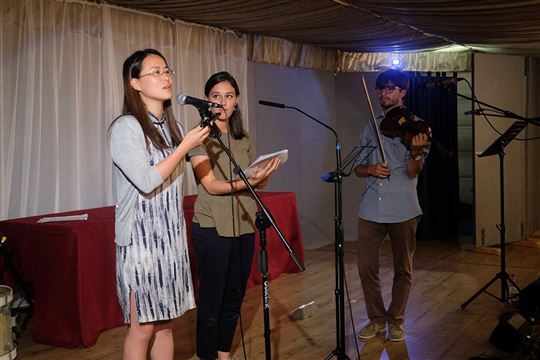
And someone who has thought very differently is Mikel Azurmendi, a Basque sociologist who participated, in the 1960s, in the foundation of ETA (from which he was kicked out for being opposed to the use of violence. “I owe you all so much,” he says to the leaders of CL. “I came here to thank you.” From that time in 2016 when he was invited to the Madrid Encounter, the people in the “CL tribe” have become almost an obsession, so much so that his “field notes” on them have become a book that will come out in Spain this year. “I saw in you ‘people made of other stuff’. What dazzled me was your style of life: integral, totalizing. From children to adults. A way of living that I would define with the words “gratuity” and “dependence”, two profound dimensions of the human person. I heard you say that the reason you were like this was Jesus, whom you believe is God. At a certain point, I said to myself: this style of life is authentically human, but I have never seen in my experience someone maintain it over time, not on the individual level, even less on the communitarian level. And so? Jesus must be God.” Mikel speaks about the three people who introduced him to this “tribe”: a journalist who is on the radio from 6 to 8:30 in the morning, a priest who looked at him with respect, and a volunteer at the Madrid Encounter, who one Saturday morning went to pick him up in his car and who, in answer to the question about why he did this all for free, replied: “Life is given to be given.” “There are so many people who, like me, are searching for your life. It would be a sin if you abandoned it.” At the end of the intervention of the ex-atheist Azurmendi, the hall responded with applause, but he quieted everyone down: “There is nothing to applaud: Father Julián, lead us in a Glory Be instead.”
With this witness still in our heads, we came back to listen to the recording of a lesson given by Father Giussani. “Mikel abandoned the faith precisely during these years, around 1968, because the Church was not able to respond to his questions,” Carrón starts out: “Now, let’s hear how in those same years Giussani explained, instead, what was truly able to attract our affection.” The lesson is one hundred percent Giussani: “Christianity is an announcement, a phenomenon by a person (think of Christ), through a way of being, an engagement with his life, brings a proposal that is capable of changing your life: a claim that cannot exist except through a meaning that is absolutely new.” A nice jolt. Because everyone, if they are here, coming from Lebanon or Nigeria, from Argentina or Australia, has come across this newness at least once.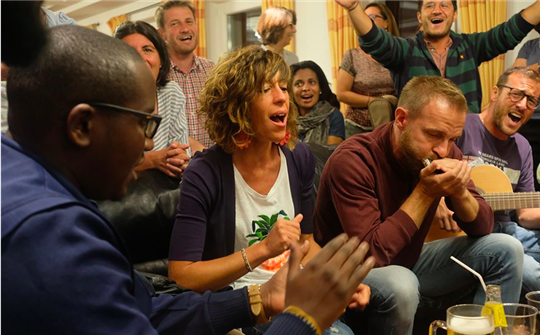
That evening, it is time for the questions that Father Ignacio Carbajosa poses to Father Carrón. The first is: “Why do you always say that what saved your life was learning what you thought you already knew?” And then: “Why do you say that you will always be grateful to Father Giussani for having allowed you to walk a human path?” It is an occasion for the leader of CL to go over again those steps that have marked his life, from the encounter with the first CL people in Spain until his transfer to Milan. His story is a hymn to the use of reason just like The Religious Sense describes it. It is a witness to perseverance on a path that tries to prove for itself what Father Giussani gave us, when he wrote the tenth chapter of his most famous book. “After a few years in Milan, I saw how the provocation of reality keeps man from flattening out,” he explains: “I began to live all the provocations of life as if they were friends: the misunderstandings, the wounds, the failures. Everything built up my person. Everything, circumstances and people, is for me, because it all collaborates to generate my person.”
The next day, we hiked to the Rifugio Pralongià. We were able to see all the Dolomites: the Sella group and the Marmolada… In front of this spectacle it is easy to remember the answer that God gives to Job: “Where were you when I laid the foundations of the world?” It was the Church’s feast of Saint Augustine. During the Mass in the mountains, Father Pigi quotes the most famous phrase of the Bishop of Hippo: “You have made us for yourself, and our heart is restless until it rests in you.” Father Aleksandr, an Orthodox priest from Cherson, Ukraine, while he was going down the chair lift, asked half-jokingly: “How can I go back to live in Cherson after seeing these mountains?”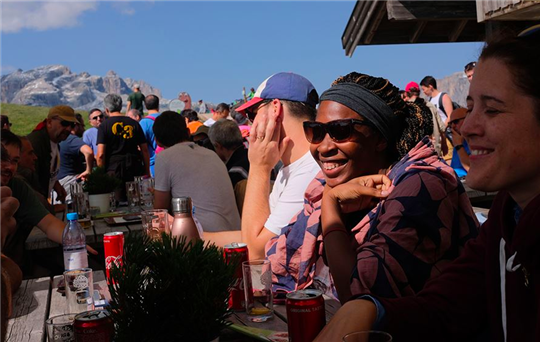
At the afternoon assembly, Father Julián de la Morena, from Brazil, underlined one of the things that emerged the preceding day: “People are very worried. In these years, the sense of fear has grown. And the faith? What good is it? The movement is a ‘dangerous’ place, a place of risk, in the sense that its continual call does not permit us to abandon ourselves to formalism: it is an intense work because we allow things to continue to speak to us.” Father Stefano Alberto returned to the exhibit on 1968 that a few university students made for the Meeting: “The title, ‘We want everything’, did not so much describe the movement back then, but a cry in the present. It appeared evident to me that the contribution that we can give is that of receiving in our life the experience of the contemporaneity of Christ. Only He can reawaken our religious sense. It is only this experience that takes away the fear in front of life’s difficulties. But there is a condition that allows this experience to remain, even when we too are subject to faithlessness of our time: following. Without recognizing the historical point where Christ reaches me, there is no rebirth of the religious sense.” Carrón concludes: “We can say that Christ is present only when he reawakens our question, exalts my I. Only He is able to reawaken and fulfill my cry. This is the great adventure.”
The assembly was over before Samir got a chance to speak. He sent his contribution to Carrón, who used it in the final synthesis: “What struck me in these days was that I can say that the event happened again in me: it is the experience of a radical newness, unforeseen and unforeseeable.” It is, deep down, the final consideration of Job: “I knew you only through hearing, but now my eyes have seen you.”